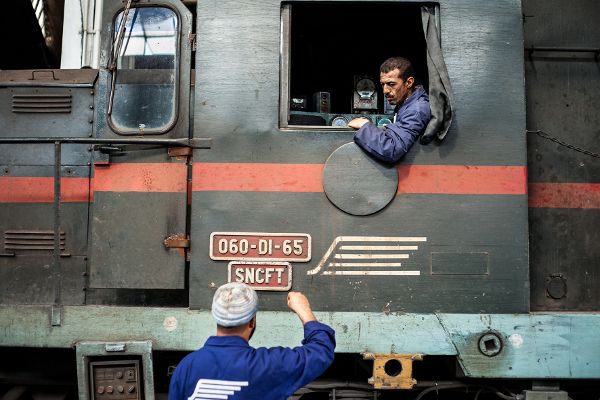Eye For Film >> Movies >> Railway Men (2018) Film Review
Railway Men
Reviewed by: Amber Wilkinson

Tunisian-French director Erige Sehri has a journalistic background that shows through in this examination of the state of Tunisia's railways. Initially playing out like the equivalent of a Panorama or Cutting Edge expose in the UK, the film also develops a more poetic element as she begins to explore the lives of the male and female drivers who operate the country's "Normal Way" - a route that runs in the north-west of the country and which we soon learn has fallen into serious disrepair.
By the time we see tracks almost shaking loose under the weight of the train it comes as little surprise, as Sehiri has already taken us aboard to join various conductors on their boneshaking journey. Chief among them are Ahmed, who is dreaming of a change of career, aspiring rap artist Abderrahim and Issameddine, a whistleblower who is carefully documenting deaths on the track despite no response from his superiors.

At first, the state of the railway itself takes precedence, as we learn the litany of problems that exist - from bent tracks to cars getting stuck on crossings, no crossing gates and warning lights that don't work. Up on the trains themselves it's little better, as the engineer is forced to fix a brake pipe on the hoof, while another train's lights completely fail. Even death comes as little surprise to the drivers. When one recounts the horrors he has seen, tallying up six in 18 years, a colleague responds: "But that's fine!" as though the number is so low it is an achievement.
Beyond the cab of the train, more sociopolitics begins to creep in, with a sense of the post-revolutionary world of Tunisia still in flux - from the lyrics of Abderrahim's songs to the way that Issameddine's warnings result in trouble for him. The subtle guitar-led scoring from Omar Aloulou, with its train-like rhythms also adds to the film's sense of lyricism as it touches on elements of everyday life away from the workplace. What the passengers think, however, remains largely a mystery - although its clear the workers are often left to carry the can for the train failings, which can even lead to beatings.
There is bravery on display here, not just in the way that the drivers continue to operate trains that they consider to be potential death traps but also in their frank discussions on camera, which will surely put them as much in the line of fire for the company's ire as Issameddine's crash tapes. Sehiri also isn't afraid to allow the documentary making itself to be visible - showing, for example, how Issameddine insists she film him as he walks off singing a song about "sad rails", where other directors might have included it as though it were an off-the-cuff moment.
Although Railway Men will doubtless hold more immediate interest for domestic audiences, who are likely to be scandalised by the state of some parts of the line, this is also well worth a look by international cinemagoers interested in the state of Tunisia today, as it offers an focused snapshot of working life in the country.
Reviewed on: 04 Jan 2019
















